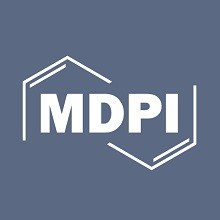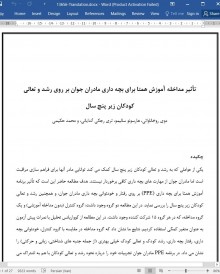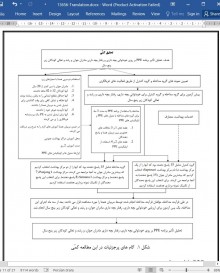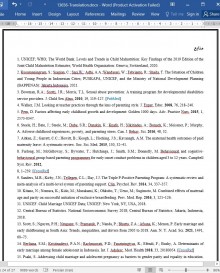
دانلود مقاله تأثیر مداخله آموزش همتا برای بچه داری مادران جوان بر روی رشد و تعالی کودکان زیر پنج سال
چکیده
یکی از عواملی که به رشد و تعالی کودکان زیر پنج سال کمک می کند توانایی مادر آنها برای فراهم سازی مراقبت است اما مادران جوان از مهارت های بچه داری کافی برخوردار نیستند. هدف مطالعه حاضر این است که تأثیر برنامه آموزش همتا برای بچه داری (PPE) بر روی رفتار و خودتوانی بچه داری مادران جوان، و همچنین رشد و تعالی کودکان زیر پنج سال را بررسی نماید. در این مطالعه دو گروه وجود داشت: گروه کنترل (بدون مداخله آموزشی) و یک گروه مداخله، که در هر گروه 15 شرکت کننده وجود داشت. در این مطالعه از کوواریانس تحلیل با نمرات پیش آزمون به عنوان متغیر کمکی استفاده کردیم. نتایج ما نشان داد که گروه مداخله در مقایسه با گروه کنترل، خودتوانی بچه داری، رفتار بچه داری، رشد کودک و تعالی کودک خیلی بهتری (از جمله جنبه های شناختی، زبانی و حرکتی) را نشان می داد. در برنامه PPE مادران جوان تجربیات خود را درباره نحوه رشد و تعالی کودکان با هم به اشتراک می گذارند، و مادران پشتیبانی های روانی را دریافت می کنند. در نهایت نتیجه گیری کردیم که برنامه PPE روی رفتار بچه داری و خودتوانی بچه داری مادران جوان، و همچنین رشد و تعالی کودکان تأثیرگذار است.
1. مقدمه
سن کمتر از پنج سال، برای کودکان دوره خیلی مهمی به حساب می آید چون سریع ترین نرخ های رشد و تعالی در طی این دوره رخ می دهد. طبق گفته سازمان بهداشت جهانی (WHO)، در بین کودکان زیر پنج سال، 7.3 درصد دچار سوء تغذیه هستند، 5.9 درصد اضافه وزن دارند، و 21.9 درصد از رشد بازمانده اند [1]. نرخ های رشد و تعالی کودکان در کشورهای درحال توسعه - از جمله اندونزی - در مقایسه با کشورهای توسعه یافته، کمتر است که این به علت عدم مصرف غذا یا تغذیه در کشورهای در حال توسعه است. این مشکل اگر در همان اوایل حل شود کودکان اندونزیایی می توانند رشد و تعالی مناسبی داشته باشند [2].
فرآیند تعالی کودکان تا حد زیادی تحت تأثیر نقش والدین است [3]. کیفیت بچه داری روی رشد و تعالی کودکان تأثیرگذار است [4]. بچه داری خوب اگر با یک ارتباط خوب پشتیبانی شود میتواند تعالی کودکان را بهبود دهند اما بچه داری ضعیف میتواند تأثیرات منفی بر روی تعالی کودکان داشته باشد [5,6]. مداخلات مربوط به بچه داری میتواند کیفیت رفتار والدین نسبت به کودکان، کیفیت سلامت کودکان، و پیوند سالم بین کودکان و والدین آنها را بهبود دهد [7-9]. یکی از چالش هایی که والدین در بچه داری با آن مواجه هستند فقدان دانش بچه داری و عدم آماده سازی اختصاصی برای تبدیل شدن به مادر/پدر است چون والدین دانش و مهارتهای بچه داری کافی را دارند چون زمانی که ازدواج می کنند سن کمی دارند [10].
5. نتیجه گیری
نتایج مطالعه حاضر نشان داد که PPE سبب افزایش معناداری در خودتوانی بچه داری و رفتار بچه داری در مادران جوان، و رشد و تعالی کودکان (جنبه های شناختی، زبانی و حرکتی) می گردد. نتایج این مطالعه و داده های بدست آمده از مرور مطالعات پیشین با حفظ اهمیت برنامه های PPE در PSE، رفتار بچه داری، و رشد و تعالی کودکان، همگرا هستند. در آینده، نتایج این تحقیق را می توانیم به عنوان منبعی برای تنظیم سیاست های آموزشی برای مادران جوان در رابطه با خودتوانی بچه داری، رفتار بچه داری، رشد و تعالی کودکان نوپا، و اجرای برنامه های PPE برای مادران جوانی که در اطراف مراکز بهداشت عمومی در اندونزی زندگی می کنند مورد استفاده قرار دهیم. این مطالعه محدودیت هایی از لحاظ اندازه کوچک نمونه و اجرای تحقیق داشت که در دوران شیوع کووید 19 انجام شد. بنابراین تحقیقات آینده می توانند از نمونه بزرگتری استفاده کنند تا نتایج دقیق تری بدست آورند. در ضمن افزایش طول مدت مداخله را می توان مورد بررسی قرار داد تا تأثیرات ایجاد شده بر روی رشد و تعالی کودکان به شکل دقیق تری ارزیابی گردد.
Abstract
One of the contributing factors in the growth and development of children under five is the mother’s ability to provide childcare, but young mothers do not have enough parenting skills. The goal of the current study was to examine the effect of the parenting peer education (PPE) programme on young mothers’ parenting self-efficacy and behaviour, and the growth and development of children under five. There were two groups, which were a control group (without intervention) and an intervention group, in which there were 15 participants in each group. Analysis covariance with the pre-test scores as covariates was used in this study. The results showed that, compared with the control group, the intervention group reported significantly better parenting self-efficacy, parenting behaviour, children’s growth, and children’s development, including cognitive, language, and motoric aspects. The PPE programme can exchange the young mothers’ experiences on how their children grow and develop, and the mothers will also receive psychological support. In conclusion, the PPE programme affected the young mothers’ parenting self-efficacy and parenting behaviour and the children’s growth and development.
1. Introduction
The under-five period is a very important period for children because the fastest development and growth rates occur in this period. According to the World Health Organization (WHO), 7.3% of children under five are malnourished, 5.9% of children under five are overweight, and 21.9% of children under five have stunted growth [1]. The children’s development and growth rates in developing countries, including Indonesia, are slower than in developed countries due to the lack of consumption of food or nutrition in developing countries. If the problem can be addressed early on, Indonesian children can grow and develop properly [2].
The process of children’s development is greatly influenced by the role of parents [3]. The parenting quality influences the growth and development of children [4]. Good parenting supported by good communication can improve the children’s development, while poor parenting can result in a negative impact on the children’s development [5,6]. Interventions in parenting can improve the quality of parenting behaviour towards children, the quality of children’s health, and the healthy bond between children and their parents [7–9]. One of the challenges that parents face in parenting is the lack of parenting knowledge and no special preparation for becoming parents, because the parents do not have enough parenting knowledge and skills because they are too young when they get married [10].
5. Conclusions
The results of this study showed that PPE significantly increased parenting self-efficacy, parenting behaviour in young mothers and children’s growth and development (cognitive, language and motor aspects). The results of this study and data from the literature review converge to maintain the importance of PPE programmes on PSE, parenting behaviour and children’s growth and development. In the future, the results of this research can be used as a reference for formulating educational policies for young mothers regarding parenting self-efficacy, parenting behaviour, and toddler growth and development, as well as the implementation of PPE programmes for young mothers who live around public health centres in Indonesia. This study was limited by the small sample size and the implementation of the research, which was carried out during the COVID-19 pandemic. Therefore, future research can use a larger sample to obtain more accurate results. In addition, increasing the duration of the intervention could be considered so that the impact on children’s growth and development can be measured more accurately.
Young mothers’ parenting self-efficacy score
Young mothers’ parenting behaviour score
Children under 5 ’s growth score
Children under 5’s development score
Cognitive
Language
Motoric
چکیده
1. مقدمه
2. مواد و روشها
2.1 شرکت کنندگان
2.2 طراحی و روند
2.3 مداخله
2.4 ارزیابی
2.4.1 خودتوانی بچه داری
2.4.2 رفتار بچه داری
2.4.3 رشد کودکان زیر پنج سال
2.4.4 تعالی کودکان زیر پنج سال
2.5 تحلیل داده
3. نتایج
3.1 توزیع خصوصیات پاسخ دهندگان
3.2 آزمون بهنجاری برای داده های متغیرهای خودتوانی و رفتار بچه داری مادران جوان، و رشد و تعالی کودکان زیر پنج سال
3.3 آزمون همگنی برای داده های متغیرهای خودتوانی و رفتار بچه داری مادران جوان، و رشد و تعالی کودکان زیر پنج سال
3.4 تحلیل کوواریانس (ANCOVS) با در نظر گرفتن نمرات پیش آزمون به عنوان متغیرهای کمکی
4. بحث
4.1 تأثیر برنامه آموزش همتا برای بچه داری بر روی خودتوانی بچه داری مادران جوان
4.2 تأثیر برنامه آموزش همتا برای بچه داری بر روی رفتار بچه داری مادران جوان
4.3 تأثیر برنامه آموزش همتا برای بچه داری بر روی کودکان زیر پنج سال
4.4 تأثیر برنامه های آموزش همتا برای بچه داری بر روی تعالی کودکان زیر پنج سال
5. نتیجه گیری
منابع
Abstract
1. Introduction
2. Materials and Methods
2.1. Participants
2.2. Design and Procedure
2.3. Intervention
2.4. Measurement
2.4.1. Parenting Self Efficacy
2.4.2. Parenting Behaviour
2.4.3. Children under 5’s Growth
2.4.4. Children under 5’s Development
2.5. Data Analysis
3. Results
3.1. The Distribution of Respondents’ Characteristics
3.2. The Normality Test for the Variable Data of Young Mothers’ Parenting Self-Efficacy and Behaviour, and the Growth and Development of Children under Five
3.3. The Homogeneity Test for the Variable Data of Young Mothers’ Parenting Self-Efficacy and Behaviour, and the Growth and Development of Children under Five
3.4. Analysis of Covariance (ANCOVA) with the Pre-Test Scores as Covariates
4. Discussion
4.1. Effect of Parenting Peer Education Programme on the Young Mothers’ Parenting Self-Efficacy
4.2. Effect of Parenting Peer Education Programme on Young Mothers’ Parenting Behaviour
4.3. Effect of Parenting Peer Education Programme on Children under Five’s Growth
4.4. The effect of Parenting Peer Education Programmes on Children under Five’s Development
5. Conclusions
References
این محصول شامل پاورپوینت ترجمه نیز می باشد که پس از خرید قابل دانلود می باشد. پاورپوینت این مقاله حاوی 21 اسلاید و 5 فصل است. در صورت نیاز به ارائه مقاله در کنفرانس یا سمینار می توان از این فایل پاورپوینت استفاده کرد.
در این محصول، به همراه ترجمه کامل متن، یک فایل ورد ترجمه خلاصه نیز ارائه شده است. متن فارسی این مقاله در 8 صفحه (2100 کلمه) خلاصه شده و در داخل بسته قرار گرفته است.
علاوه بر ترجمه مقاله، یک فایل ورد نیز به این محصول اضافه شده است که در آن متن به صورت یک پاراگراف انگلیسی و یک پاراگراف فارسی درج شده است که باعث می شود به راحتی قادر به تشخیص ترجمه هر بخش از مقاله و مطالعه آن باشید. این فایل برای یادگیری و مطالعه همزمان متن انگلیسی و فارسی بسیار مفید می باشد.
بخش مهم دیگری از این محصول لغت نامه یا اصطلاحات تخصصی می باشد که در آن تعداد 50 عبارت و اصطلاح تخصصی استفاده شده در این مقاله در یک فایل اکسل جمع آوری شده است. در این فایل اصطلاحات انگلیسی (تک کلمه ای یا چند کلمه ای) در یک ستون و ترجمه آنها در ستون دیگر درج شده است که در صورت نیاز می توان به راحتی از این عبارات استفاده کرد.
- ترجمه فارسی مقاله با فرمت ورد (word) با قابلیت ویرایش و pdf بدون آرم سایت ای ترجمه
- پاورپوینت فارسی با فرمت pptx
- خلاصه فارسی با فرمت ورد (word)
- متن پاراگراف به پاراگراف انگلیسی و فارسی با فرمت ورد (word)
- اصطلاحات تخصصی با فرمت اکسل



